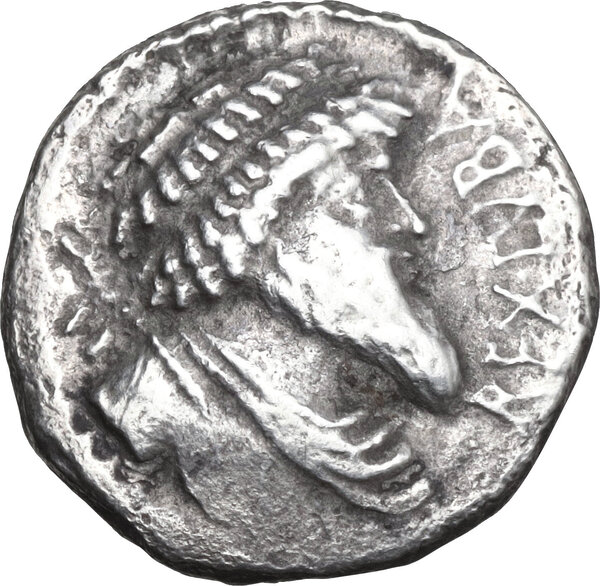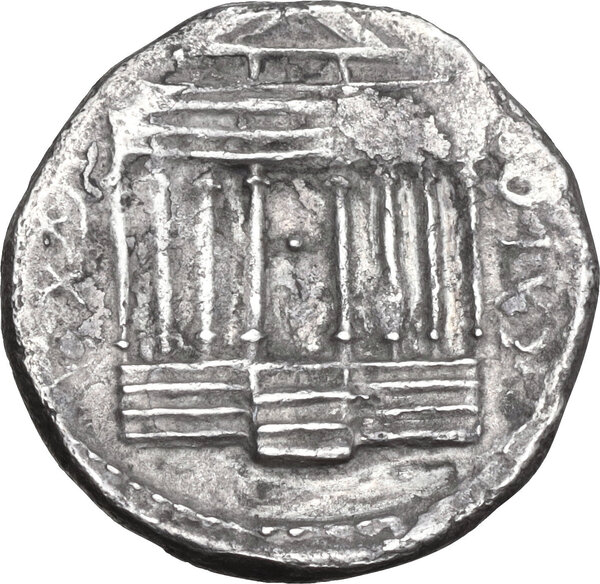









Lotto 310:
Juba I, king of Numidia (85-46 BC). AR Denarius, c. 60-46 BC. Utica mint. Obv. Diademed and draped bust right, sceptre over shoulder; before, REX IVBA. Rev. Neo-Punic legend HMMLKT-IWB I. Octastyle temple. Mazard 379. SNG Cop. 523. 3.52 g. 18 mm. Perfectly centred, nicely toned. Rough surfaces. About VF. Juba I (born c. 85 BC—died 46 BC, near Thapsus) king of Numidia, sided with the followers of Pompey and the Roman Senate in their war against Julius Caesar in North Africa (49–45 BC).
Succeeding his father, Hiempsal II, sometime between 63 and 50 BC, Juba became bitterly hostile toward Caesar because of a personal insult (probably in 63 BC). In addition, one of Caesar’s supporters, the tribune Curio, unsuccessfully proposed the incorporation of Numidia as a Roman province in 50 BC. In 49 BC Curio landed in Africa to expel Pompey’s forces but was defeated and killed by Juba, who thereupon considered himself the potential master of all North Africa.
Pompey died the following year, but the African resistance continued under Metellus Scipio (to whom Juba was allied). In 46 BC Caesar himself came to subdue them. Juba had to divide his substantial army of infantry, cavalry, and elephants because his kingdom had been invaded from the west by Caesar’s ally Bocchus, king of Mauretania, and an Italian adventurer, Publius Sittius. Juba was defeated with the other adherents of Pompey at Thapsus, and his general in the west was killed by Sittius. Repulsed from Utica by Cato (Uticensis) and expelled from his temporary capital Zama by its inhabitants, Juba committed suicide (Encyclopaedia Britannica).
During the period from 60 to 46 BC Juba struck this silver portrait coin of the same weight of Roman denarii. It circulated with the Pompean troops and it is usually found in the hoards of that epoch.
Succeeding his father, Hiempsal II, sometime between 63 and 50 BC, Juba became bitterly hostile toward Caesar because of a personal insult (probably in 63 BC). In addition, one of Caesar’s supporters, the tribune Curio, unsuccessfully proposed the incorporation of Numidia as a Roman province in 50 BC. In 49 BC Curio landed in Africa to expel Pompey’s forces but was defeated and killed by Juba, who thereupon considered himself the potential master of all North Africa.
Pompey died the following year, but the African resistance continued under Metellus Scipio (to whom Juba was allied). In 46 BC Caesar himself came to subdue them. Juba had to divide his substantial army of infantry, cavalry, and elephants because his kingdom had been invaded from the west by Caesar’s ally Bocchus, king of Mauretania, and an Italian adventurer, Publius Sittius. Juba was defeated with the other adherents of Pompey at Thapsus, and his general in the west was killed by Sittius. Repulsed from Utica by Cato (Uticensis) and expelled from his temporary capital Zama by its inhabitants, Juba committed suicide (Encyclopaedia Britannica).
During the period from 60 to 46 BC Juba struck this silver portrait coin of the same weight of Roman denarii. It circulated with the Pompean troops and it is usually found in the hoards of that epoch.
Base d'asta € 50
Prezzo attuale € 220
Offerte: 16
Lotto non in vendita
Prezzo attuale € 220
Offerte: 16
Lotto non in vendita





